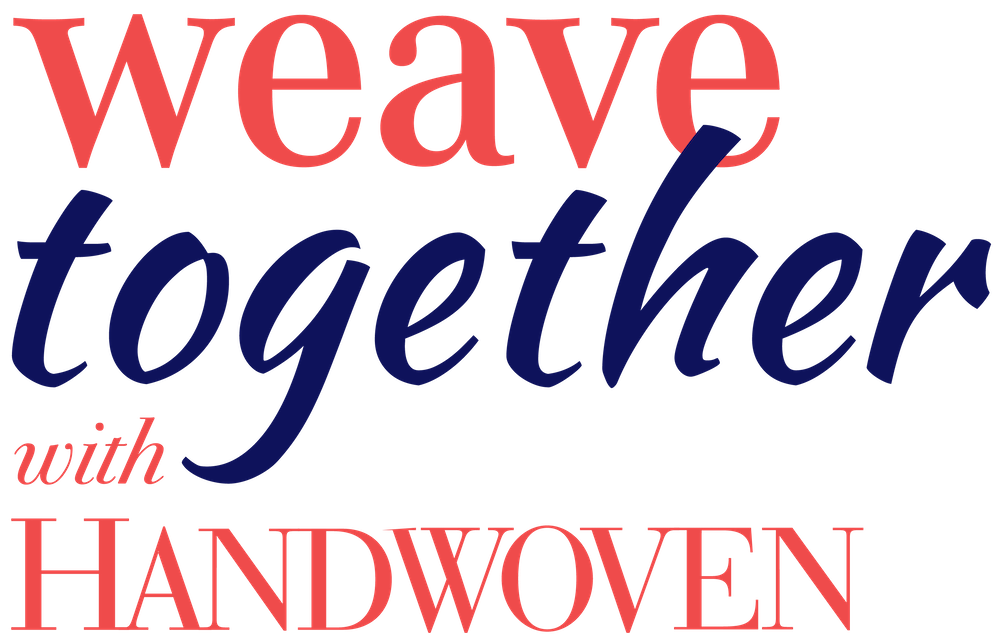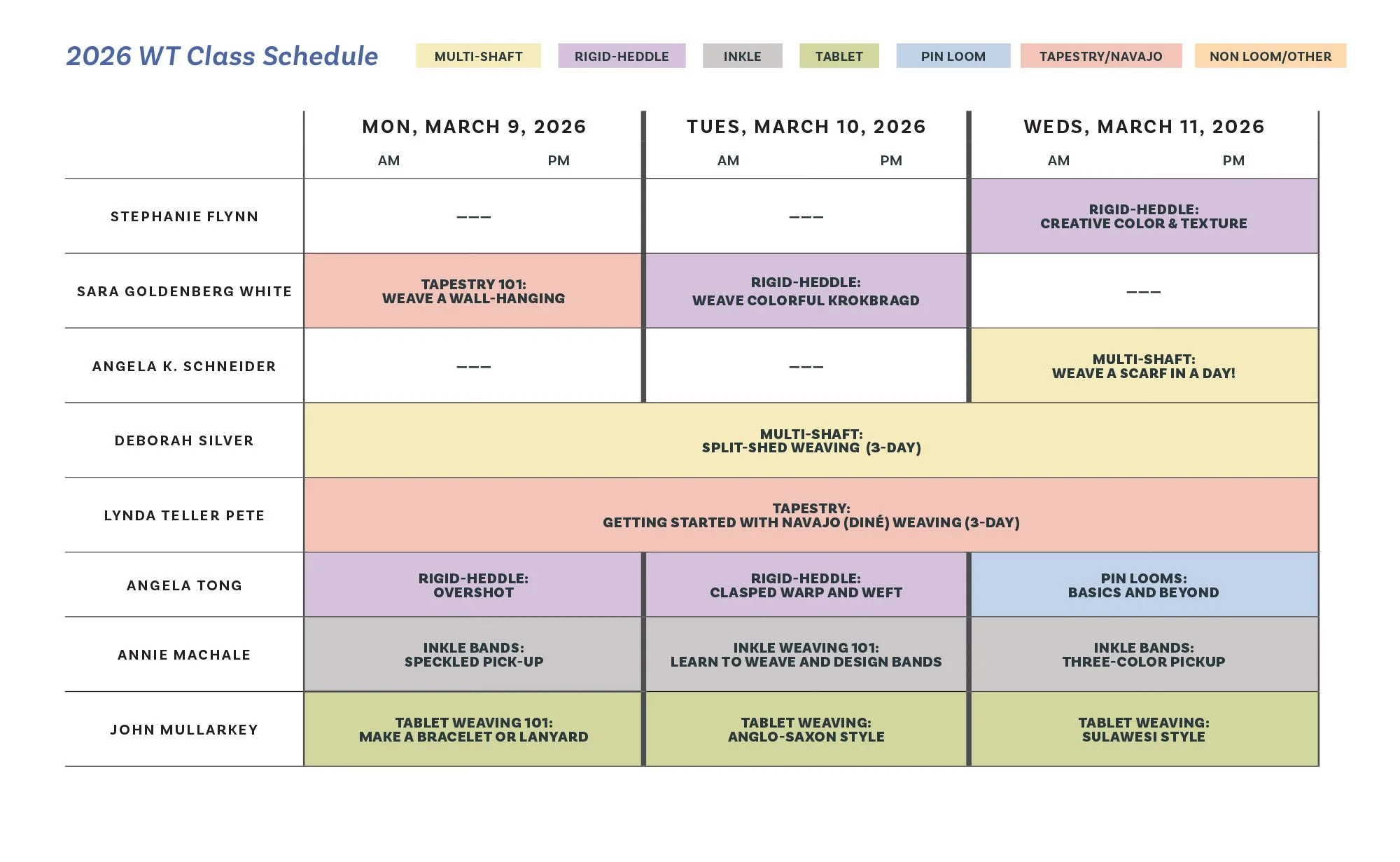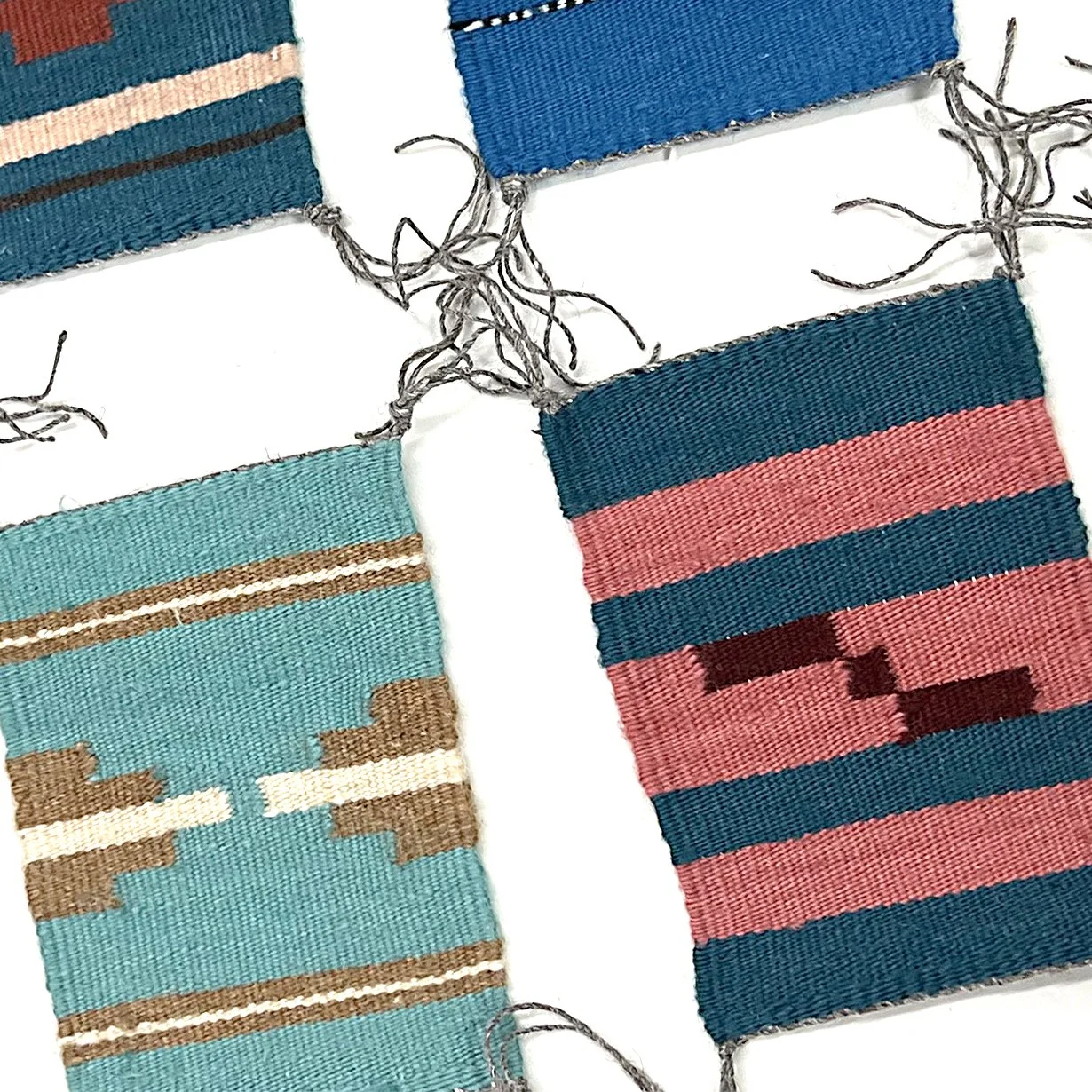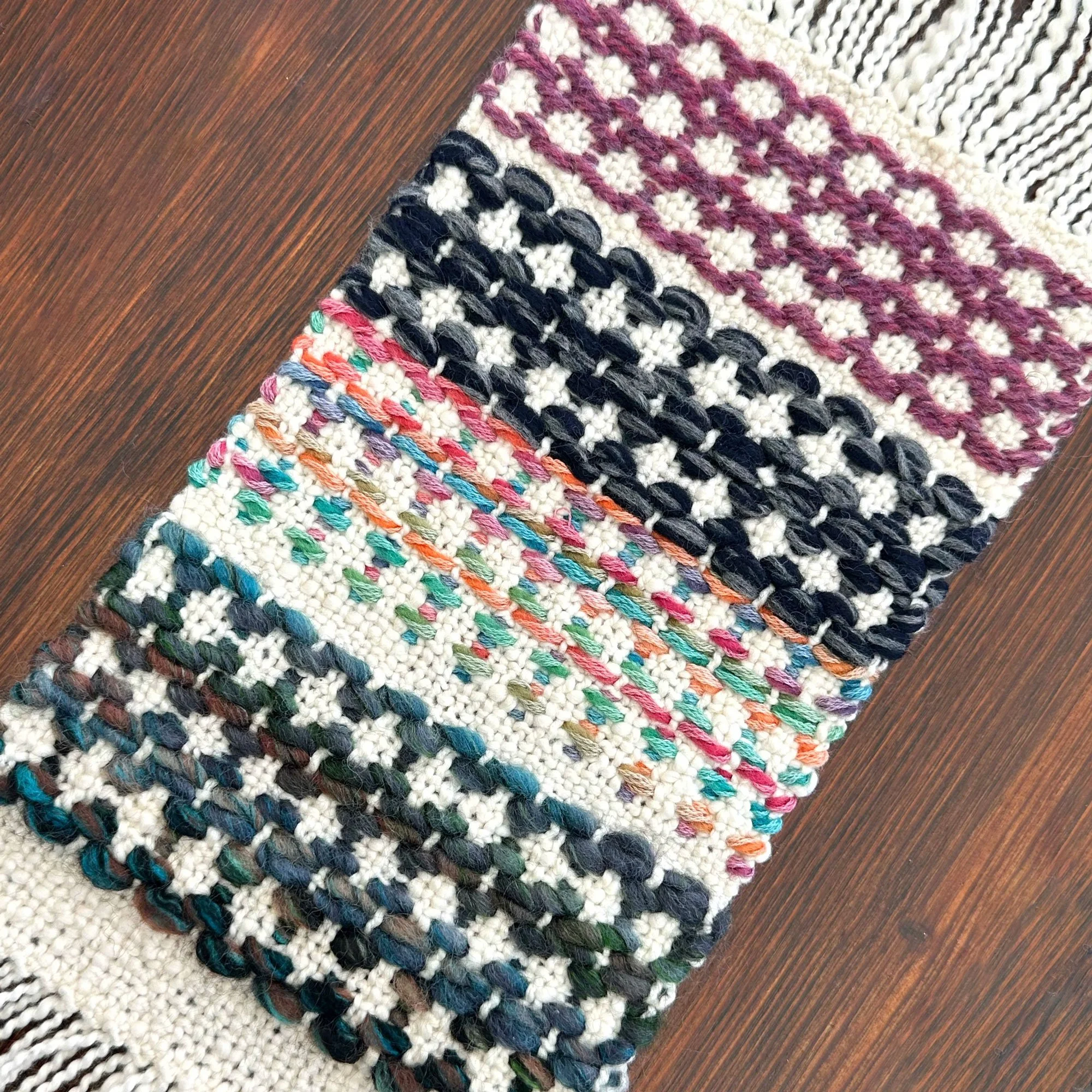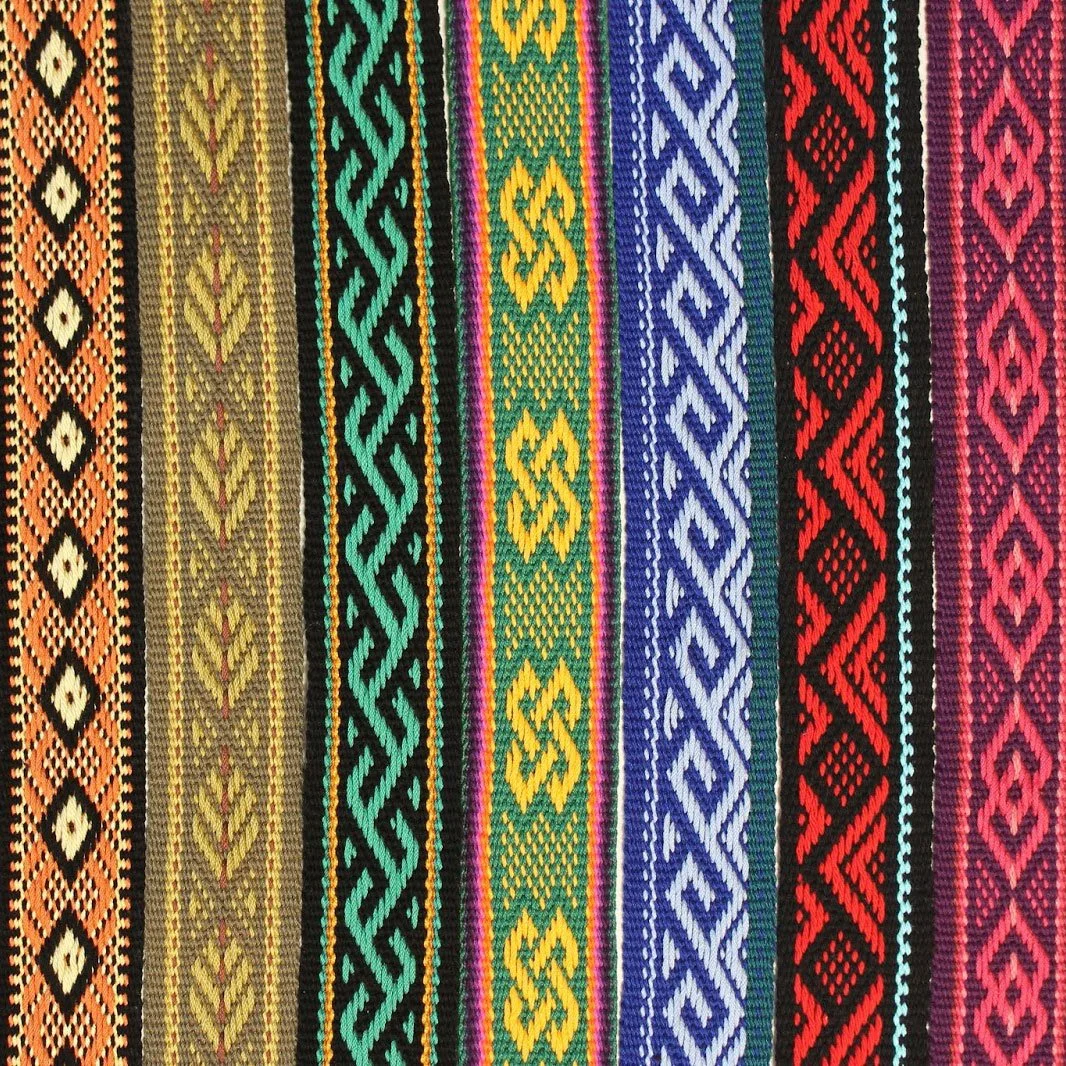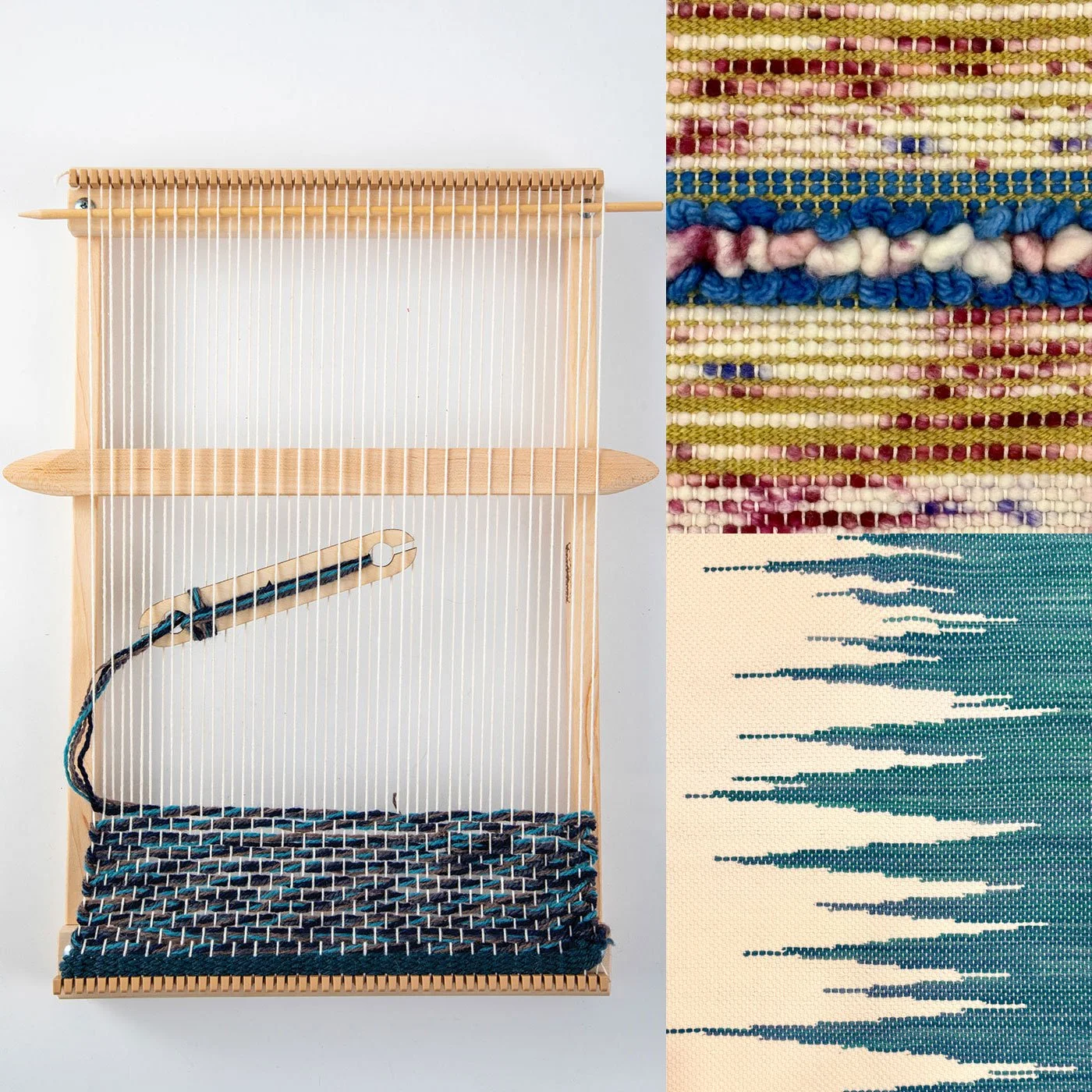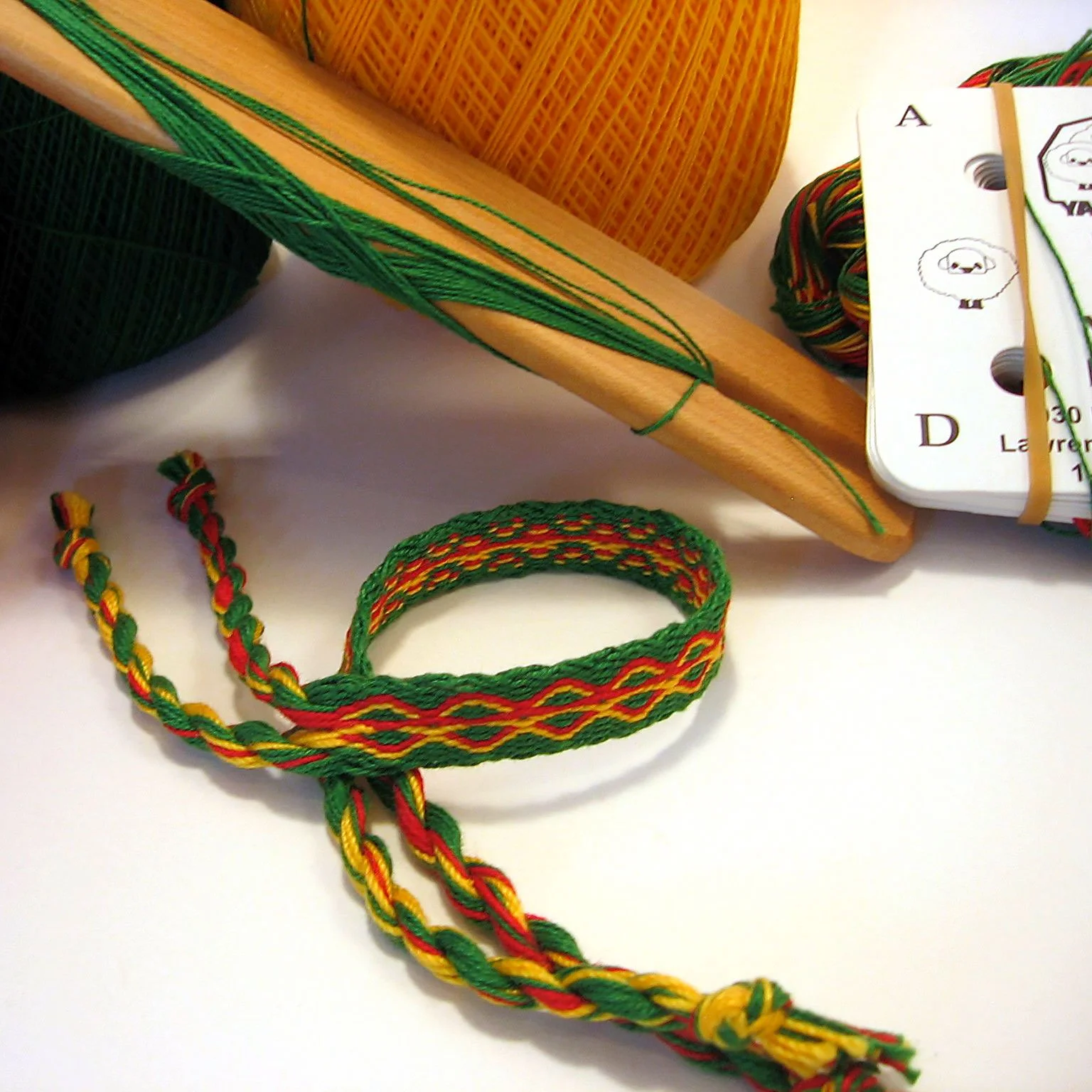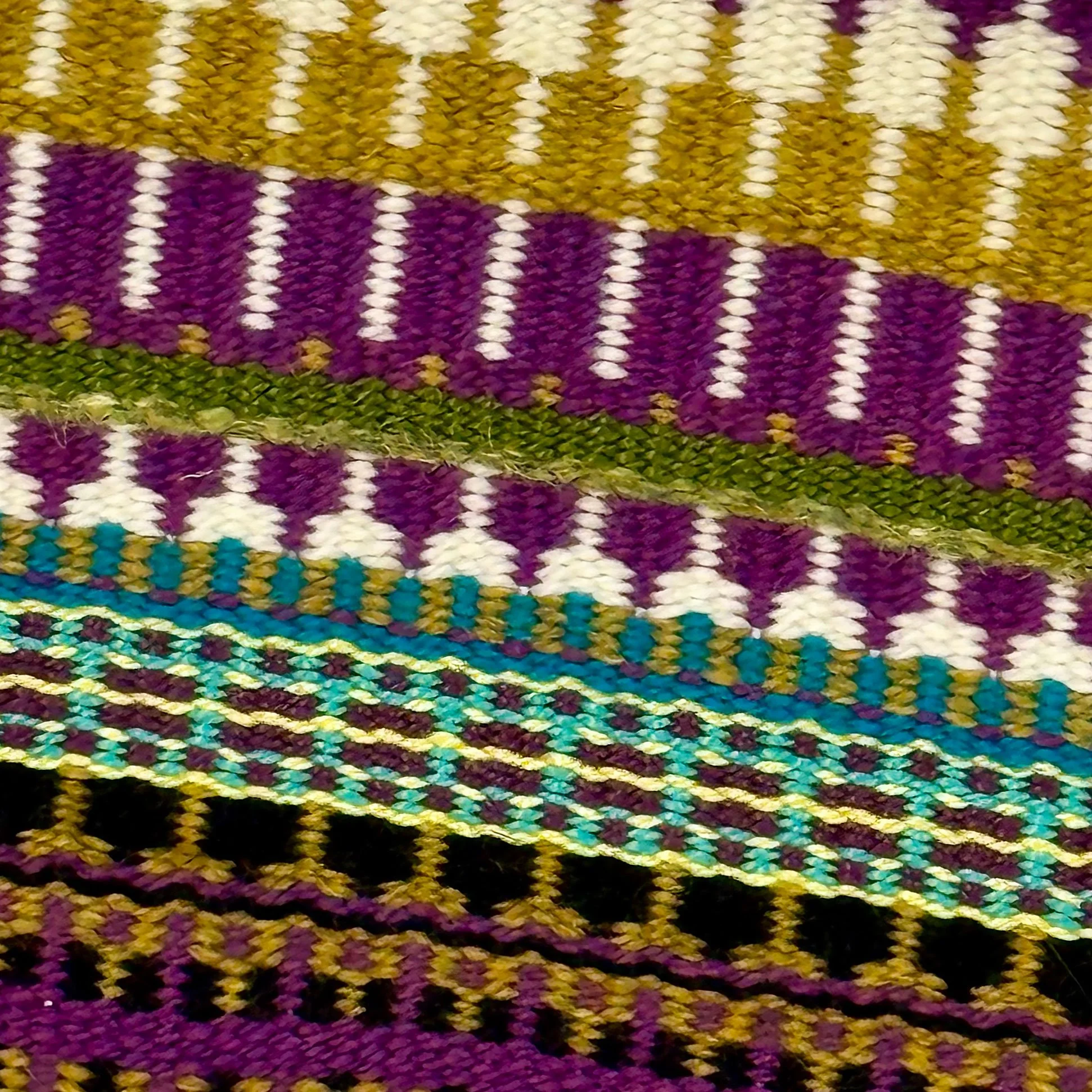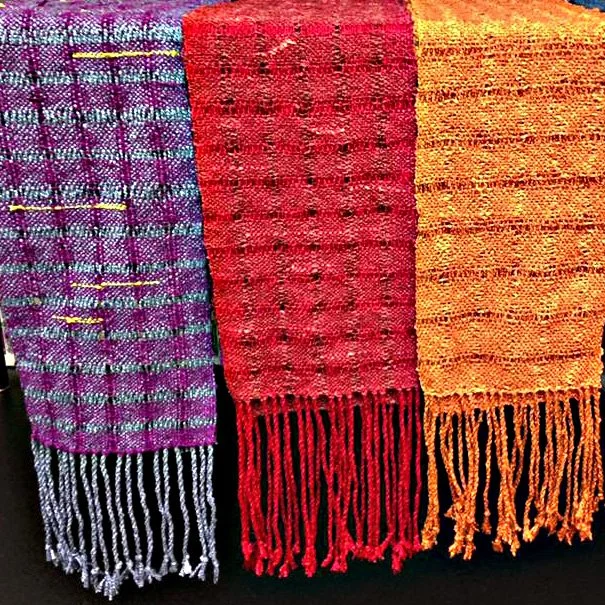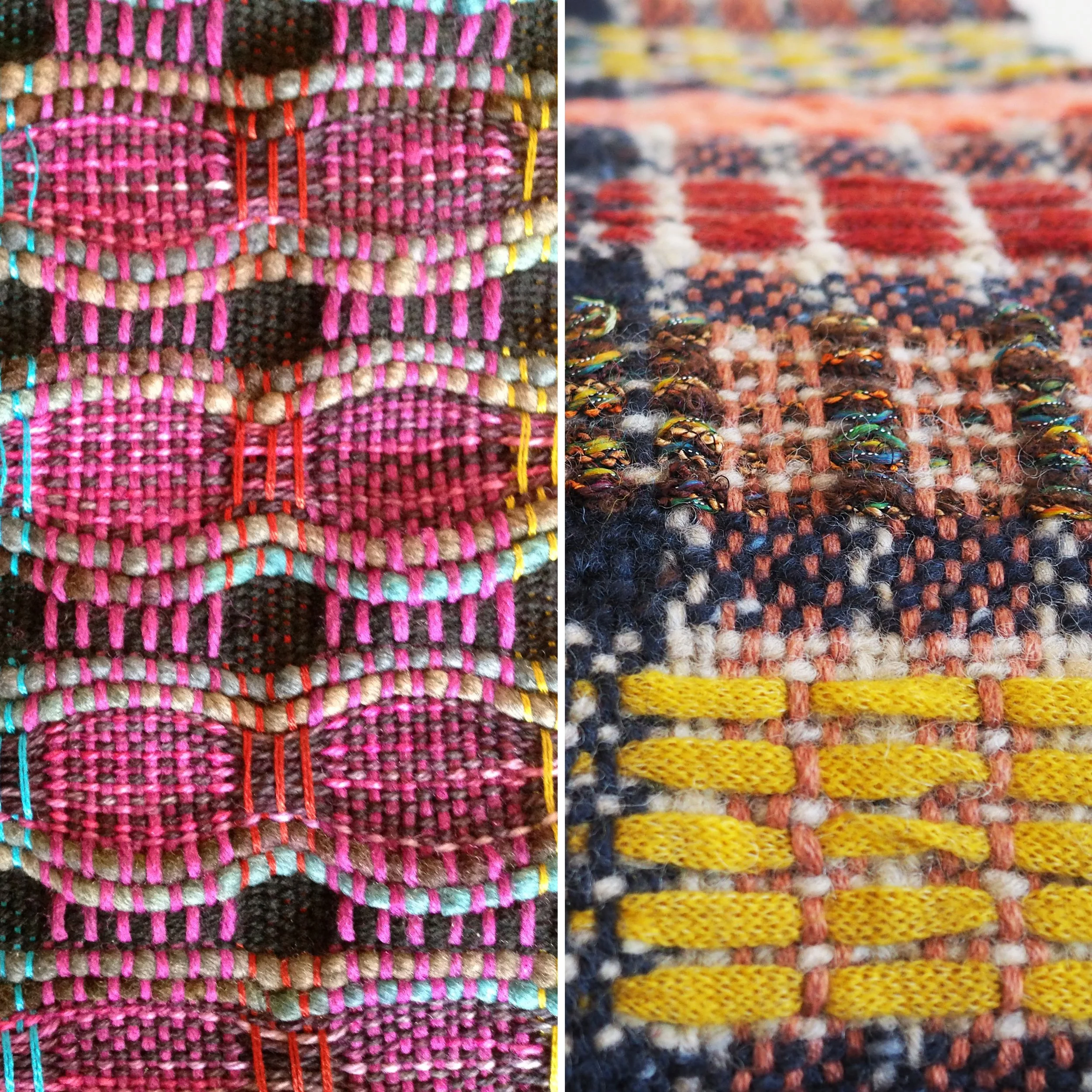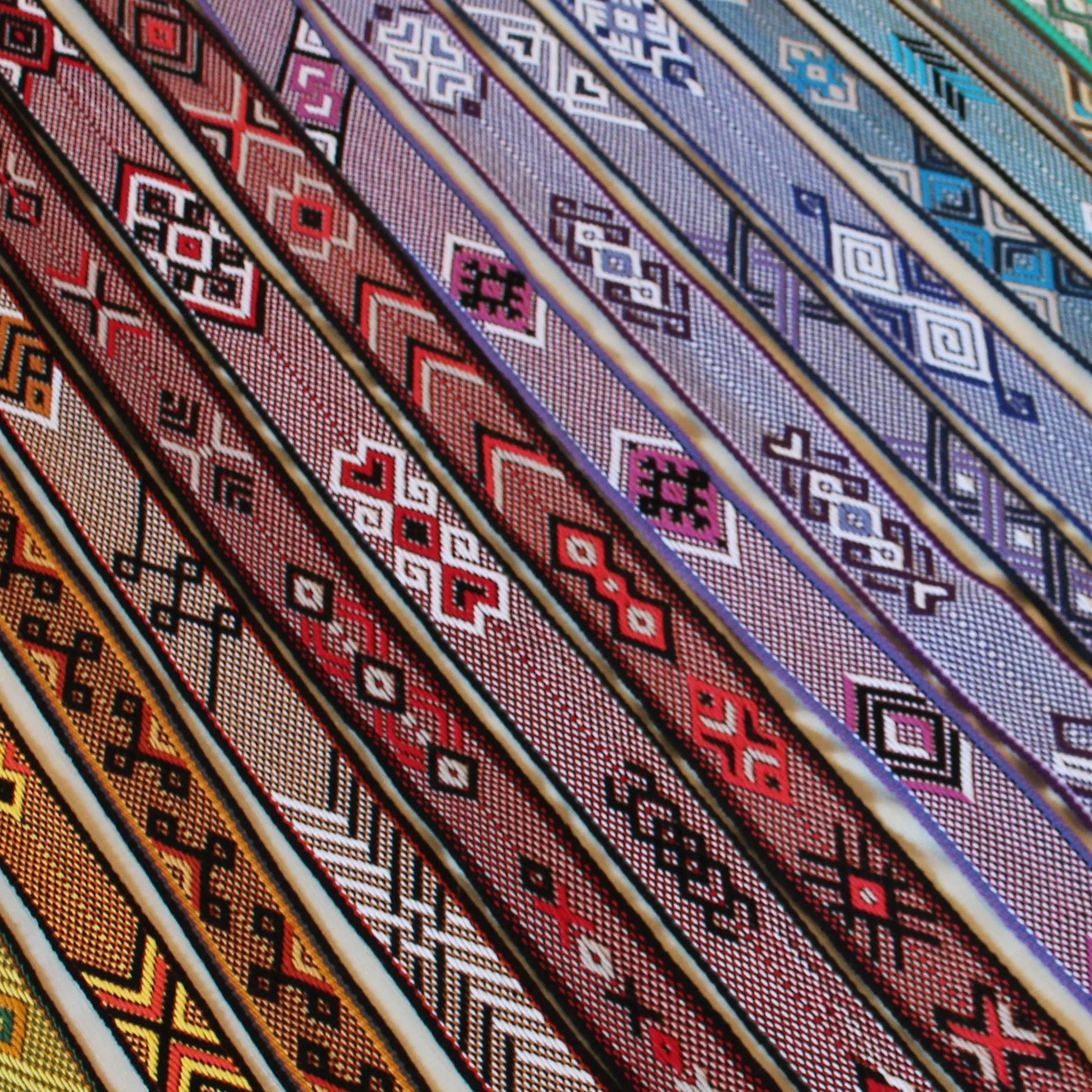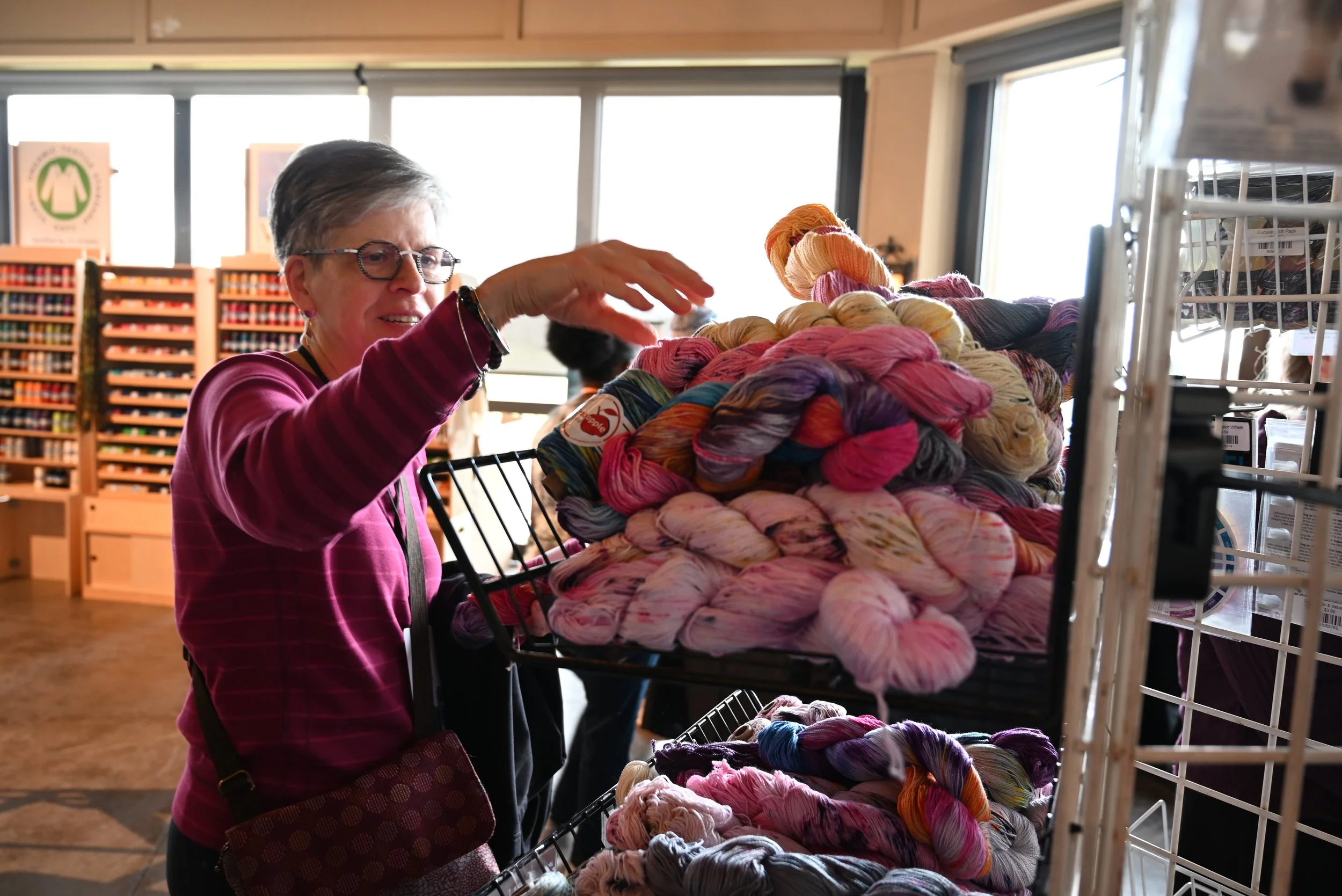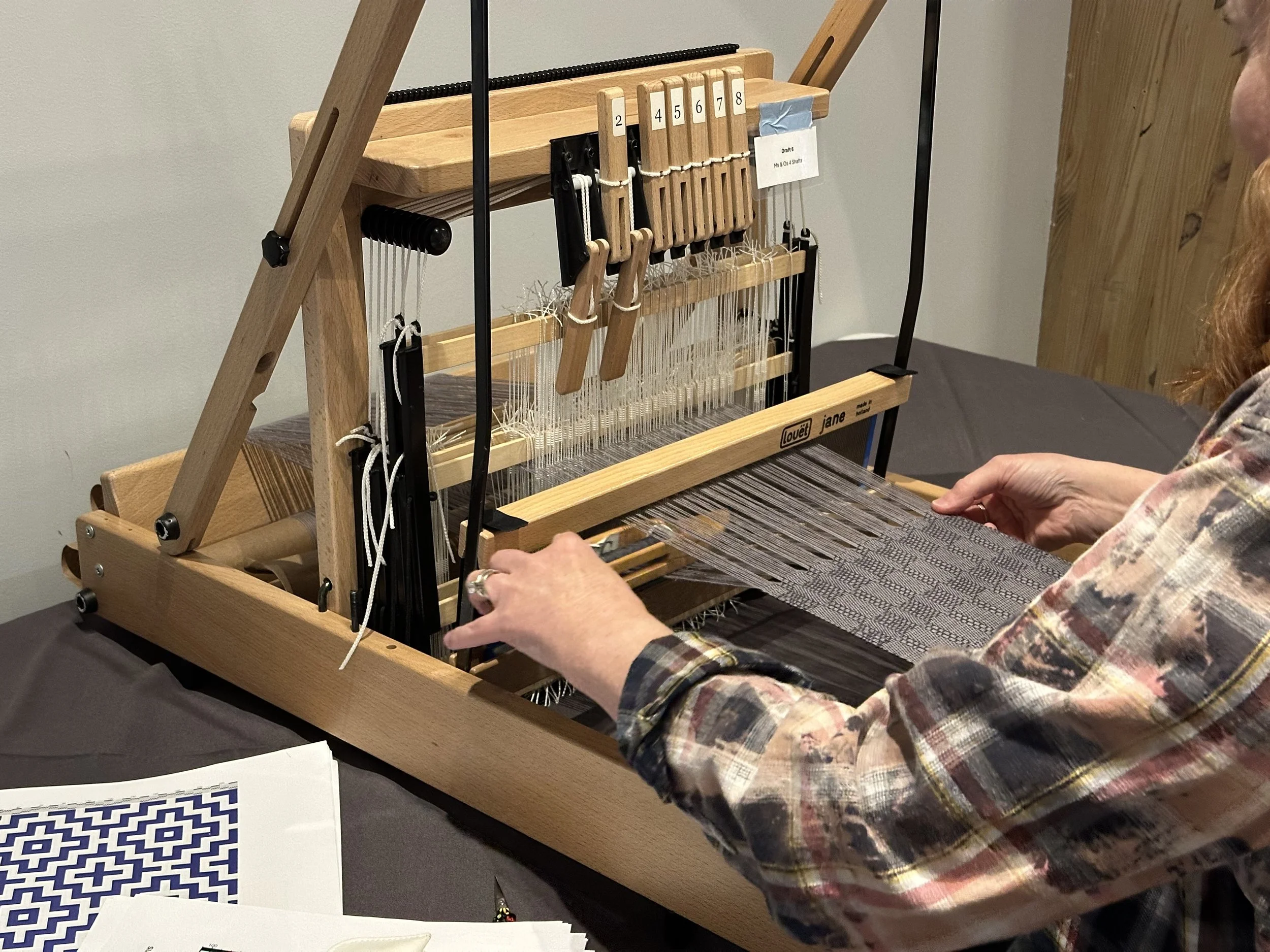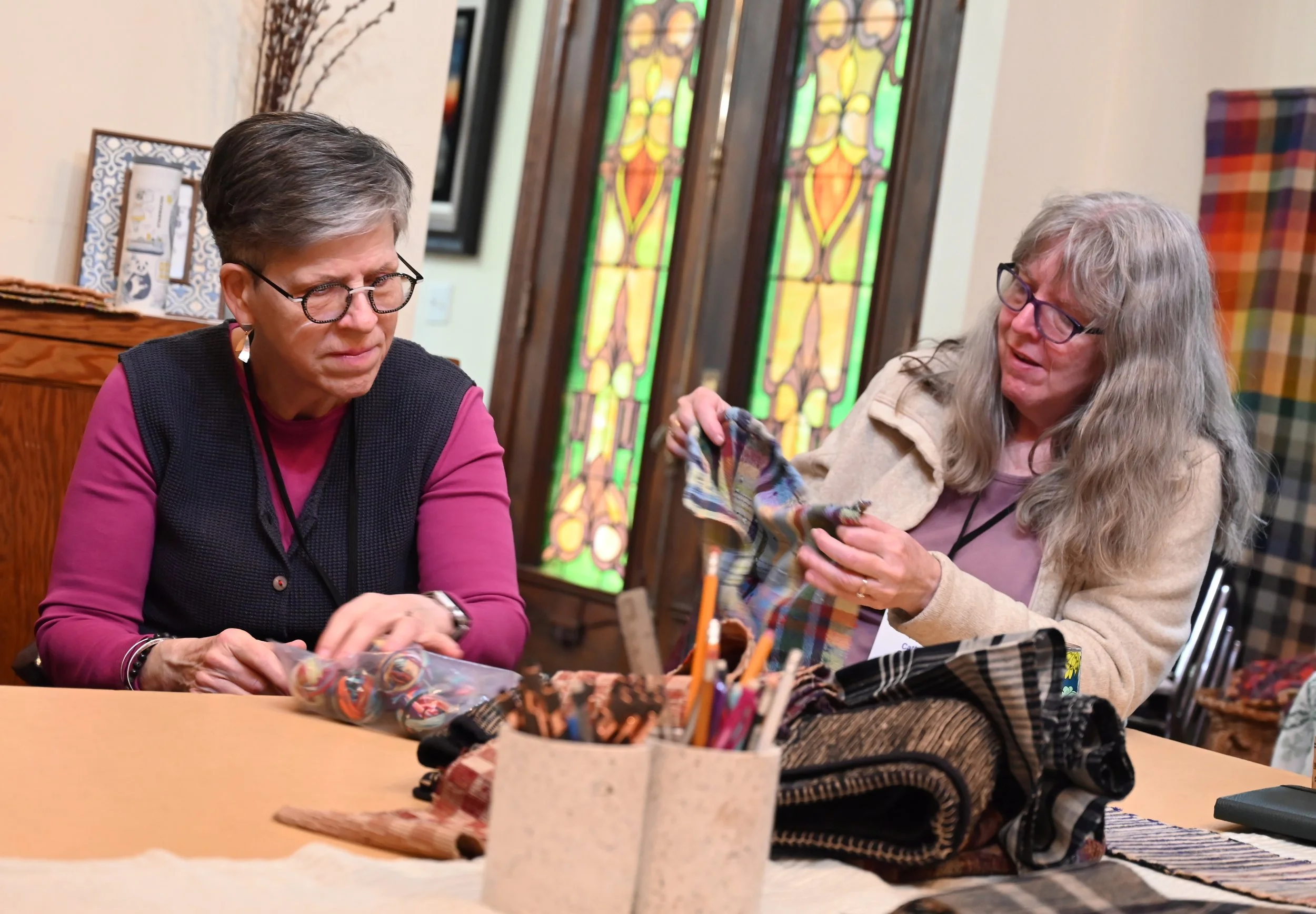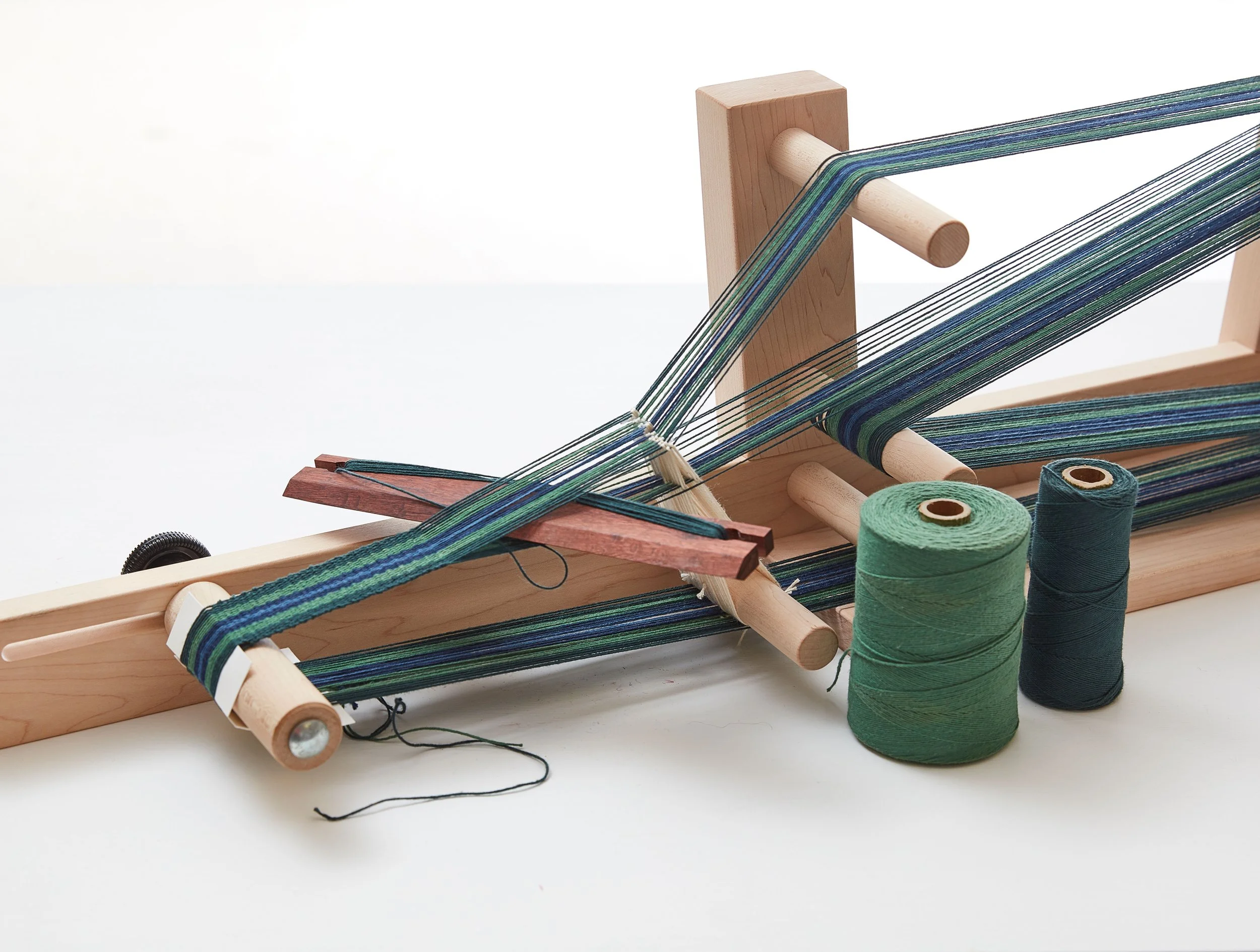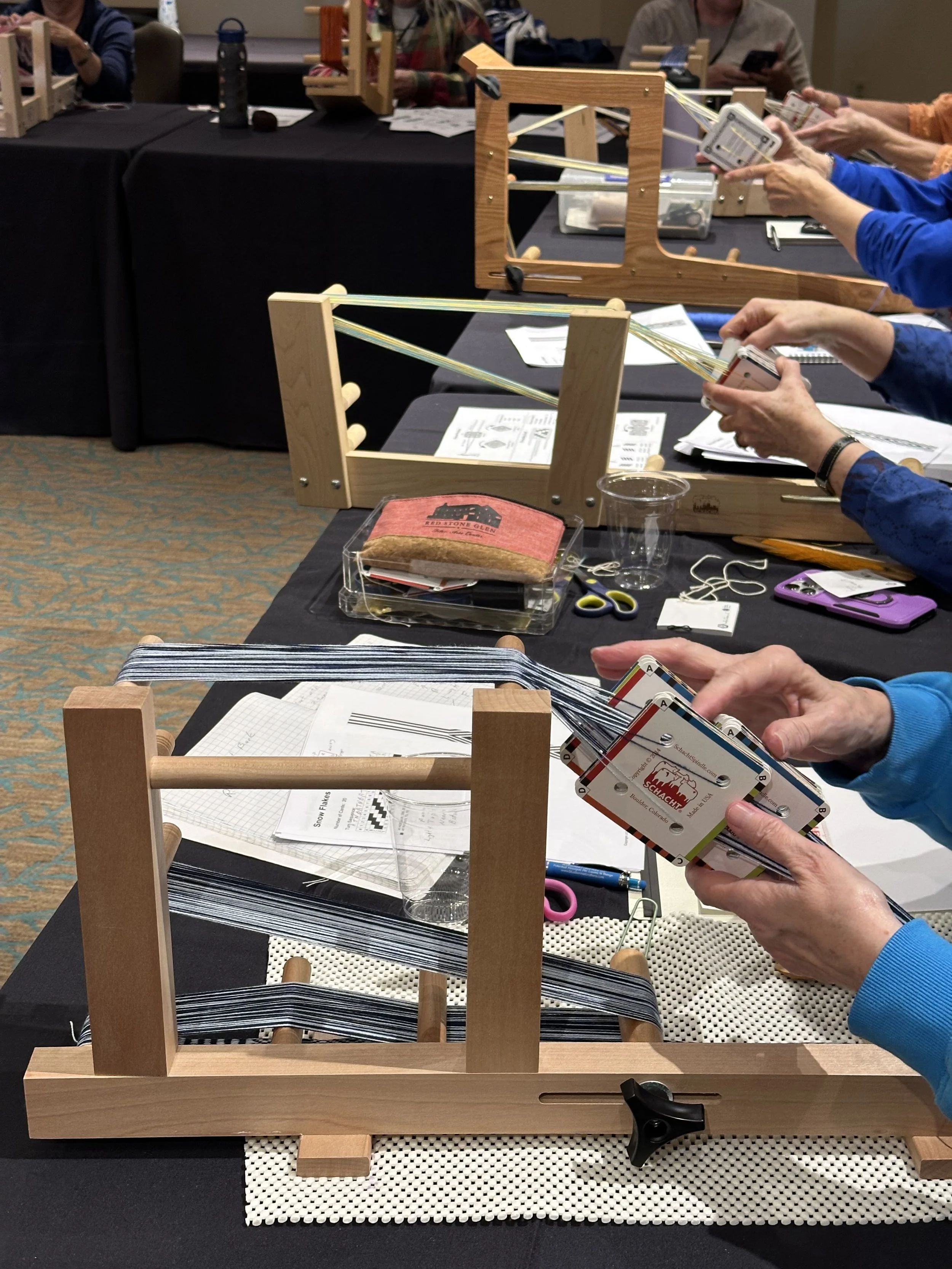Enjoy a Hands-on Weaving Retreat with Handwoven and Little Looms!
Whether you’re a multi-shaft weaver or small looms are more your style, this special event is just for you. From March 8–12, 2026, join us in Loveland, Colorado, for four days of weaving, community, and fun. You’ll find much to love in our broad range of courses, all led by top-notch teachers.
Don’t miss this worry-free weaving getaway! All accommodations, breakfasts, lunches, dinners, classes, marketplace access, and evening events are included, but space is limited.
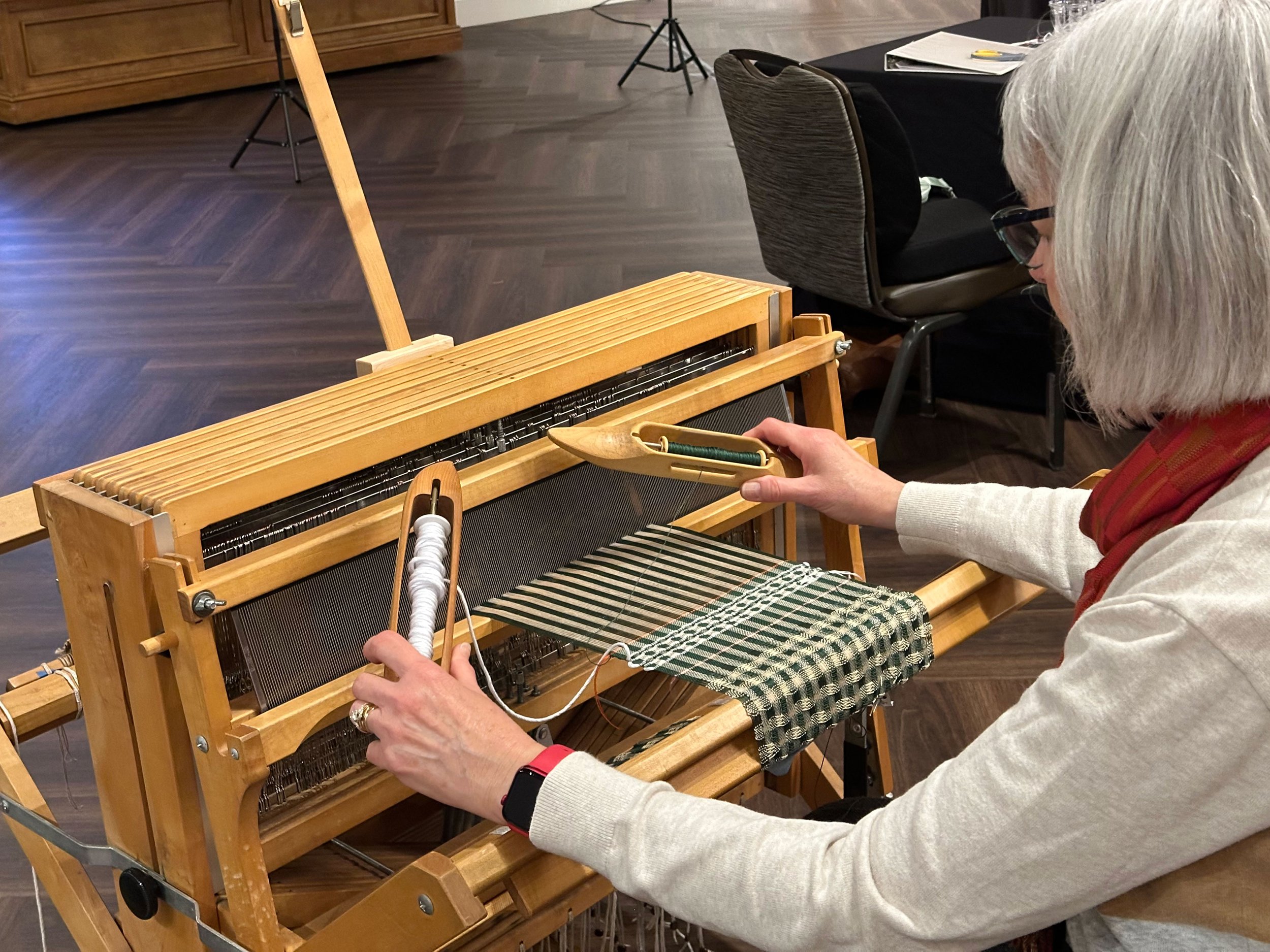
Take a break from your everyday life at the Weave Together with Handwoven and Little Looms retreat, where you’ll learn and weave alongside old and new friends alike. Here’s your chance to expand or sharpen your weaving skills on multi-shaft, pin, inkle, tapestry, and rigid-heddle looms.
You’ll spend your days in engaging classes with great teachers, plus you’ll have opportunities to relax with weaving friends over meals and in the evenings. When you’re in the mood for fiber-y shopping, the marketplace will be ready and waiting for you!
What Are Past Attendees Saying?
-
“Truly wonderful experience and I am looking forward to the next event!”
Edward C.
-
“I so enjoyed the camaraderie of being with other weavers and teachers. As a first-time attendee, I was impressed and hope to return next year.”
Rhonda H.
-
“It was everything I had wished and hoped for. A congenial group of people sharing the same interests. The stress of the world just melted away.”
Joan W.
-
“Great classes for a variety of levels of knowledge, terrific food, very organized, wonderful teachers and programs. . . . Just amazing. Don't know how you could improve.”
Jane H.
-
”Thank you for a fabulous weaving experience. I did not know what to expect and was simply blown away. My classes were so thorough and well-organized. The company of the other weavers was inspiring. See you next year!“
Vanessa S.
-
”I am very excited about what I learned and am already planning projects for 4–5 of the techniques I tried. It was great! ”
Robin I.
Classes
Monday Classes
Note: Some classes below are 3-day or 2-day classes. Please check the class type and description for more details.
Multi-shaft: Split-Shed Weaving for Complex Structures on Straight Threading
Instructor: Deborah Silver
Type: 3-day multi-shaft class | Day 1
In this class, you’ll learn to make curves and blend colors—even weave pictures—on a four-shaft loom with no special equipment. Using a straight threading and changing only tie-ups between samples, you’ll learn how to weave combinations of structures within a single shed: Twills, summer and winter, doubleweave, Han damask, taqueté, piqué, and more! You’ll learn how continuous, complementary, and supplementary wefts work in those weave structures to create easy-to-weave effects that look complex.
-
Four-shaft floor loom (preferred) or table loom
-
EQUIPMENT:
Four-shaft loom with a 10" minimum weaving width, pre-warped
15-dent or other reed to achieve 15 epi
Three 12"–16" stick shuttles
Scissors
YARN:
Warp: 8/4 cotton carpet warp
Weft: A variety of yarns (details will be sent along with setup instructions)
-
T-pins
Medium- to fine-point permanent marker in contrasting color to your warp
Clamp light and extension cord
Ball, skein, and bobbin winders
A few large safety pins
10 yards thick wool or cotton rug weft scraps (for filler between samples)
Fishing sinkers or weights for loose selvedges
Light table, if you’d like to convert images for weaving
-
Instructor will provide all cartoon-making materials and instructional hand-outs. Instructions for pre-warping and for suitable wefts will be sent by email before the event.
-
Students should be comfortable warping a four-shaft loom and weaving a simple four-shaft draft.
Tapestry: Getting Started with Navajo (Diné) Weaving
Instructor: Lynda Teller Pete
Type: 3-day Navajo (Diné) weaving class | Day 1 (looms provided)
In this workshop for weavers of all skill levels, you will learn the basics of Navajo weaving and design while making a small rug. Beginning with a pre-warped traditional loom, you will begin weaving right away. As you work, award-winning master Navajo weaver Lynda Teller Pete will share personal stories and experiences, giving you fascinating insights into the world of Navajo weaving and culture. (Please note that this style of weaving is physically demanding; see Prerequisites for requirements.)
Class is currently at capacity. Waitlist requests can be made during class selection.
-
Instructor will provide a Navajo upright vertical loom for use during class.
-
Bring your own seat cushion, bathmat, or towel
Bring your own clip-on light and extension cord
For use during class, instructor will provide a warped loom, tabletop attachments, clamps, yarn, beginning and finishing Navajo weaving tools, and a supply bag with scissors, needles, measuring tape, pencils, erasers, sharpener, clips, graph paper, sample designs, colored pencils.
-
If you are bringing your own Navajo weaving tools, please label them beforehand.
-
Students will have the opportunity to purchase equipment after class if desired.
-
Navajo weaving requires strength and stamina. Students must be able to sit and perform repetitive movements comfortably for at least 6 hours per day. They must have finger, hand, and arm dexterity, and be able to weave without stopping frequently to ease neck and back discomfort. Navajo weaving requires intense concentration, which can be fatiguing. Students should be able to work independently and steadily to complete the small rug in three days. Please contact [email protected] if you have questions about participating in the class.
Rigid-Heddle: Learn to Weave Overshot
Instructor: Angela Tong
Type: 1-day rigid-heddle class
Learn how to weave beautiful overshot patterns on the rigid-heddle loom using just one heddle and a pick-up stick. Angela will go over all the basics of the overshot structure to get you started on this new weaving adventure, and then you’ll weave a sample using what you’ve learned. Discover endless design possibilities as you weave these complex patterns using simple pick-up techniques.
Class is currently at capacity. Waitlist requests can be made during class selection.
-
Rigid-heddle loom
-
EQUIPMENT
10" or larger rigid heddle loom
7.5- or 8-dent heddle
2–3 stick shuttles
Pick-up stick
Tapestry needle
Scissors
Tape measure
YARN
Warp: 8/4 or 3/2 cotton or cotton blend OR sport weight/DK weight wool or wool blend
Weft (tabby): Sport-weight cotton/cotton blend OR sport-weight wool/wool blend in a solid color that will contrast with your weft pattern yarns
Weft (pattern): Worsted-weight cotton/cotton blend OR worsted-weight wool/wool blend in 2–3 colors that will contrast against your weft tabby yarn
Scrap yarn
-
A notebook and pen/pencil.
-
Students will be warping their looms in class. Instructor will provide handouts during class.
-
Students must be familiar with warping a rigid-heddle loom and weaving plain weave.
Inkle Bands: Spice Things Up with Speckled Pick-Up
Instructor: Annie MacHale
Type: 1-day inkle-weaving class
Whether you call it Baltic, Sámi, or supplementary warp, speckled pick-up is simple to learn while providing vast possibilities for exciting patterns on a woven band. During this class, we’ll look at a range of samples that use this technique, explore simple pick-up and pick-and-drop patterns, and learn to read and create charts. Then you’ll set up your loom and weave a sampler of patterns. Annie will share tips for warping, making heddles, fixing mistakes, starting and stopping, and keeping selvedges straight.
-
Inkle loom
-
EQUIPMENT
Inkle loom
Thirty string or Texsolv heddles of the proper length to fit your loom
Belt or stick shuttle
Sharp scissors
YARN
Three colors of cotton yarn (20 wraps per inch or less, such as #3 pearl/crochet cotton, sport, or DK). Two of the yarns should have a high value contrast (one dark, one light) for the pattern area; the border color may be any color.
-
Pick-up stick
Laptop or tablet (if you’re interested in using an online design tool)
-
We will be warping in class.
-
Students must be proficient at warping an inkle loom independently, and comfortable weaving plain weave.
Tapestry 101: Weave a Wall-Hanging
Instructor: Sara Goldenberg White
Type: 1-day tapestry course
No weaving experience required
Explore color and texture as you master the basics of tapestry weaving, including how to warp your loom, how to weave using a set of basic techniques, and how to handle different weft materials. As you learn traditional tapestry and weaving techniques, you’ll be creating a small wall hanging. Tapestry techniques can be used on more than just tapestry looms, however. Applying these traditional methods to multi-shaft or rigid-heddle weaving can take your original designs to new levels and open up a whole new world of possibility.
-
Frame-style tapestry loom
-
Frame loom without shedding device
1 or 2 pick-up sticks
2-3 small shuttles
Hand beater or comb
Scissors
Measuring tape
-
Shed stick
Scraps of worsted-weight yarn
-
Instructor will provide warp and weft yarn. Please note: This class will not accommodate tapestry looms with shedding devices, which require a different warping technique.
-
None
Tablet Weaving 101: Make a Bracelet or Lanyard
Instructor: John Mullarkey
Type: 1-day tablet-weaving class
No weaving experience required
Learn the basics of tablet weaving by weaving a band you can turn into a bracelet or lanyard. You’ll begin by learning to read tablet weaving drafts. Then you’ll set up the cards on your loom, weave a band, and learn about finishing techniques. Along the way, you’ll learn how to avoid common pitfalls, as well as tips and tricks for weaving perfect bands.
-
Inkle loom
-
EQUIPMENT
Full-size inkle loom with open side
Twenty 4-hole cards
Belt shuttle
Scissors
YARN
Balls or cones of 5/2, 8/2, or 10/2 mercerized or unmercerized cotton or #10 crochet thread: two balls of one color and two balls of a different and highly contrasting color.
-
None
-
There will not be time in class to wind off yarn, so please come prepared with four balls or cones of yarn. Full-size inkle looms required; small-sized looms (such as Inklettes) will not work for this technique.
-
None
Tuesday Classes
Note: Some classes below are 3-day or 2-day classes. Please check the class type and description for more details.
Multi-shaft: Split-Shed Weaving for Complex Structures on Straight Threading
Instructor: Deborah Silver
Type: 3-day multi-shaft class | Day 2
Continues from Monday. See the class description and details in the Monday class listing.
Tapestry: Getting Started with Navajo (Diné) Weaving
Instructor: Lynda Teller Pete
Type: 3-day Navajo (Diné) weaving class | Day 2 (looms provided)
Continues from Monday. See the class description and details in the Monday class listing.
Class is currently at capacity. Waitlist requests can be made during class selection.
Rigid-Heddle: Learn to Weave Colorful Krokbragd
Instructor: Sara Goldenberg White
Type: 1-day rigid-heddle class
Learn how to weave krokbragd, a beautiful weft-faced Norwegian structure that opens up a variety of new ways to create patterns in your weaving. In this class, you’ll learn how to set up your rigid-heddle loom for krokbragd using a pick-up stick and string heddles on a heddle rod. Then you’ll weave while exploring the whole new world of patterning possibilities that this intriguing structure provides.
-
Rigid-heddle loom
-
EQUIPMENT
8" or larger rigid-heddle loom, pre-warped
8-dent heddle plus one extra heddle of any dent to use for making string heddles
Two pick-up sticks
2–3 stick shuttles
Apron rod or a sturdy dowel at least 4" wider than the warp width
8/4, 5/2, or 3/2 cotton for making string heddles
Scissors
Set of colored markers, pencils, or crayons
YARN
Warp: 8/4 cotton carpet warp or 5/2 cotton
Weft: Worsted-weight yarn
-
None
-
Before class, warp the loom and 8-dent heddle with either 8/4 cotton carpet warp or 5/2 cotton to 6"–10" wide. Instructor will provide instructional handouts, and some worsted-weight wool for weft.
-
Must be able to warp a rigid-heddle loom and weave plain weave.
Inkle Weaving 101: Learn to Weave and Design Bands
Instructor: Annie MacHale
Type: 1-day inkle-weaving class
No weaving experience required
Learn the techniques and artistry of weaving beautiful bands that are endlessly useful in your everyday life. We’ll look at samples and at ways to create variations. You’ll learn two methods of creating patterns— a free online tool, and a graph-paper method. You’ll warp and weave your own band design (or you can weave designs supplied by the instructor). Annie will share tips for warping, making heddles, fixing mistakes, keeping selvedges straight, and finishing your bands.
-
Inkle loom
-
EQUIPMENT
Inkle loom
Thirty string or Texsolv heddles of the proper length to fit your loom
Belt or stick shuttle
Sharp scissors
YARN
3–5 colors of cotton yarn (20 wraps per inch or less, such as #3 pearl/crochet cotton, sport or DK). Two of the yarns should have a high value contrast (one dark, one light) for the pattern area; the border color may be any color.
-
Graph paper and colored pencils
Laptop or tablet (if you’re interested in using an online design tool)
-
We will be warping in class.
-
None
Rigid-Heddle: The Fun of Clasped Warp and Weft
Instructor: Angela Tong
Type: 1-day rigid-heddle class
Create dramatic color changes across your weaving with the help of clasped warp and clasped weft techniques. You’ll learn how to control color patterning by choosing where the warp or weft colors meet. Create blocks of solid color, gradations, painted warp effects, and so much more. With a warping peg and two sources of yarn, you can take even simple plain weave to colorful new heights!
-
Rigid-heddle loom
-
EQUIPMENT
10" or larger rigid-heddle loom
7.5- or 8-dent heddle
2–4 stick shuttles
Warping peg
Threading hook
Clamps for loom and warping peg
Warp separator (warping sticks, craft paper, or paper grocery bags)
Tapestry needle
Scissors
Tape measure
YARN
Fingering weight yarn, 3–4 colors that contrast with each other. One color can be a variegated or gradient yarn, and the other three colors solids or semi-solids; or all the colors can be solids or semi-solids.
Scrap yarn
-
A notebook and pen/pencil.
-
We will be warping in class. Instructor will provide handouts to students.
-
Students should be comfortable with direct-warping a rigid-heddle loom, and have experience weaving plain weave on a rigid-heddle loom.
Tablet Weaving: Anglo-Saxon Style
Instructor: John Mullarkey
Type: 1-day tablet-weaving class
Come learn how Anglo-Saxons wove with tablets more than a thousand years ago. Bands originating in the fifth and sixth centuries A.D. were woven using this very specific technique, which differs from the way we weave with tablets today. Although it’s similar to threaded-in patterns in the way tablets are set up, the weaving produces a thicker, stronger—and reversible—band that is perfect for bag straps or belts. You’ll learn to set up your tablets and then you’ll weave a band using this technique. If you’re a tablet weaver, you’ll want to add this style to your repertoire.
Class is currently at capacity. Waitlist requests can be made during class selection.
-
Inkle loom
-
EQUIPMENT
Full-size inkle loom with open side
Twenty 4-hole cards
Belt shuttle
Scissors
YARN
Three balls or cones of 5/2, 8/2, or 10/2 mercerized or unmercerized cotton, or #10 crochet thread in three different colors, at least ½ ounce each.
-
None
-
There will not be time in class to wind off yarn, so please come prepared with three balls or cones of yarn. Full-size inkle looms required; small-sized looms (such as Inklettes) will not work for this technique.
-
Basic tablet weaving experience required. If you’re a beginner, sign up for Monday’s Tablet Weaving 101 class so you’ll be ready to dive right in to this technique.
Wednesday Classes
Note: Some classes below are 3-day classes. Please check the class type and description for more details.
Multi-shaft: Split-Shed Weaving for Complex Structures on Straight Threading
Instructor: Deborah Silver
Type: 3-day multi-shaft class | Day 3
Continues from Tuesday. See the class description and details in the Monday class listing.
Tapestry: Getting Started with Navajo (Diné) Weaving
Instructor: Lynda Teller Pete
Type: 3-day Navajo (Diné) weaving class | Day 3 (looms provided)
Continues from Tuesday. See the class description and details in the Monday class listing.
Class is currently at capacity. Waitlist requests can be made during class selection.
Multi-Shaft 101: Weave a Scarf in a Day!
Instructor: Angela K. Schneider
Type: 1-day multi-shaft class (looms provided)
No weaving experience required
In just one day, with no multi-shaft weaving experience, you can weave your own one-of-a-kind scarf! You’ll start off in the morning with a loom that’s pre-warped and ready to go. As you work, you’ll learn the specific steps of weaving, how to change the weft yarn, and several options for customizing your scarf. You’ll learn how to remove your scarf from the loom and finish it (including making a fringe). You’ll end the day with a scarf—and you’ll be ready to move on to the next level.
-
Four-shaft loom (looms will be provided for this class)
-
Scissors
-
Shuttle with bobbins
-
Warped looms and all yarns will be provided for students. If you would like to bring and use your own loom, please reach out to [email protected].
-
None
Rigid-Heddle: Creative Color and Texture
Instructor: Stephanie Flynn
Type: 1-day rigid-heddle class (looms provided)
Are you ready to experiment on this simple but fantastic loom? You’ll weave a sampler using color to create patterns, then jump into using a pick-up stick to add texture. You’ll also learn hand-manipulation techniques including clasped weft, soumak, Ghiordes knots, and more. Spark your creativity with new ideas about color and texture—they’ll open and expand your weaving horizons. Though you’ll learn on a rigid-heddle loom in this class, these techniques can also be applied to multi-shaft weaving.
-
Rigid-heddle loom (looms will be provided for this class)
-
Scissors
Darning needle
Note-taking supplies
-
None
-
Looms, shuttles, and yarn will be provided for your use during class.
-
Must be able to warp a rigid-heddle loom and weave plain weave.
Tablet Weaving: Sulawesi Style
Instructor: John Mullarkey
Type: 1-day tablet-weaving class
Come learn a tablet weaving technique that hails from Indonesia! Bands created on the island of Sulawesi have beautiful patterning and color interactions. You’ll learn how to weave these bands, as well as how to design your own patterns for them. Sulawesi-style tablet weaving is similar in structure to a double-faced weave, and similar in patterning to diagonal weaves. This technique will expand your horizons of what’s possible with tablet weaving.
-
Inkle loom
-
EQUIPMENT
Full-sized inkle loom with open side
Twenty 4-hole cards
Belt shuttle
Scissors
YARN
Balls or cones of 5/2, 8/2, or 10/2 mercerized or unmercerized cotton or #10 crochet thread in light, medium, and dark colors—1 ball of light, 2 balls of the same medium color, and 1 ball of dark, at least ½ ounce each.
-
None
-
There will not be time in class to wind off yarn, so please come prepared with three balls or cones of yarn. Full-size inkle looms required; small-sized looms (such as Inklettes) will not work for this technique
-
Basic tablet weaving experience required. If you’re a beginner, sign up for Monday’s Tablet Weaving 101 class so you’ll be ready to dive right in to this technique.
Inkle Bands: Elevate Your Motifs with Three-Color Pickup
Instructor: Annie MacHale
Type: 1-day inkle-weaving class
If you’re familiar with speckled (or Baltic) pick-up, you’ll be amazed at how easy it is to add color and complexity to your pattern motifs using the three-color pick-up technique. First, we will look at samples and discuss what makes this different from typical Baltic patterns. You’ll learn the difference between asymmetrical and symmetrical threadings, as well as tips for choosing colors to make your patterns pop. During this class, you will warp your loom and weave motifs using pattern charts supplied by the instructor. Annie will share tips for warping, making heddles, fixing mistakes, starting and stopping, and keeping selvedges straight. She’ll also demonstrate how to temporarily remove and replace a warp, as well as how to cut a project off the loom and handle it when it is complete. If time allows, we will explore a free online tool for creating patterns.
-
Inkle loom
-
EQUIPMENT
Inkle loom
Thirty string or Texsolv heddles of the proper length to fit your loom
Belt or stick shuttle
Sharp scissors
YARN
Four colors of cotton yarn (20 wraps per inch or less, such as #3 pearl/crochet cotton, sport, or DK). Three of the yarns should have a high value contrast (one dark, one medium, one light) for the pattern area; the border yarn may be any color.
-
Laptop or tablet (if you’re interested in using an online design tool)
-
We will be warping in class.
-
Students must be proficient at warping the inkle loom and be comfortable doing plain weave. Experience with Baltic pick-up is strongly recommended.
Pin Looms: Basics and Beyond
Instructor: Angela Tong
Type: 1-day pin-loom class
No weaving experience required
Have you ever wondered how to weave exciting fabrics with a simple pin loom? With the help of pin-loom pattern expert Angela Tong, you’ll learn how to warp and weave on a 3-pin-style loom. After mastering plain weave, you’ll learn how to create patterns using a few simple techniques. Finally, Angela will teach you how to join your pin-loom pieces so you can transform small squares into something bigger and better! Throughout the class, Angela will share the tips, tricks, and best practices she’s picked up in over 10 years of weaving on pin looms. Even experienced pin-loom weavers will discover something new in this not-just-for beginners class!
-
Pin loom
-
EQUIPMENT:
3-pin-style pin loom (such as Zoom Loom or Weavette)
6" weaving needle
3" yarn needle
Scissors
A variety of yarns (specifics will be emailed to students later)
-
A notebook and pen/pencil.
-
None
-
None
What About Equipment?
You should plan to bring your own looms if that’s possible. You’re already comfortable working on them, and at the end of the retreat, you can take home any of your work in progress. But if your travel plans will make that challenging, or if you’re taking a class on a new-to-you loom, we’ll make arrangements to borrow a limited number of looms from local weavers and companies.
About 2-3 months before the event, we’ll send out an equipment survey and rental options for your classes.
Meet the Instructors
At Weave Together, you’ll learn from some of the most renowned weavers and fiber artists in the world. This year’s all-star lineup includes these new and returning instructors.
-

Angela Tong
Angela Tong is a Chinese-American fiber artist and ceramicist living in Pennsylvania. A Boston native, she studied at Massachusetts College of Art and then at the Fashion Institute of Technology. She designs knitting, crochet, and weaving patterns for books, magazines, and yarn companies. She also teaches workshops across the country and online because she loves encouraging people to learn new skills. Her love of small looms is evident in the projects she designs and videos she’s released for Easy Weaving with Little Looms. Meet this beloved instructor in our Five Questions with Angela Tong article.
-

Annie MacHale
Annie MacHale first discovered the inkle loom at the age of 17, sparking a lifelong love affair with bandweaving. She built her first loom in 1976 with the help of her dad and a library book. Annie is known to many weavers because of her blog, ASpinnerWeaver.com. She has published two books, In Celebration of Plain Weave: Color and Design Inspiration for Inkle Weavers and Three-Color Pickup for Inkle Weavers: A Modern Look at an Ancient Baltic-Style Technique. In her workshops, she shares her decades of experience as a weaver working exclusively on inkle looms, her unique insights into working with color, and her explorations of three-color pick-up. Listen in to our podcast with Annie MacHale and learn more about her fascination with bandweaving.
-

Deborah Silver
Deborah Silver teaches the art of split-shed weaving, a selvedge-to-selvedge technique that allows weavers to break out of blocks, weave curves, and blend colors in multiple weave structures. She is the author of a book about the process (The Technique of Split-Shed Weaving) and she also lectures about her technique, her artwork, and the creative process. Deborah earned a BFA in Fiber from the Cleveland Institute of Art. Her work has been shown in many national and international juried exhibitions, winning several prizes, including the ComplexWeavers Award and First Place in Complexity 2018: Innovations in Weaving. Check out this article to see how Deborah Silver has been expanding our knowledge of split-shed weaving with her explorations and her recently updated book.
-

John Mullarkey
John Mullarkey is passionate about teaching tablet weaving and exploring ways to make the art form more contemporary. Tablet weaving is a primitive technique that creates simple weave structures while offering great variation in patterning. John loves to push the technique beyond its customary limits to create original and surprising interpretations of traditional structures and designs. He is a nationally recognized teacher, valued for the patience, clarity, and organization he brings to his classes. John left his earlier software development career more than a decade ago to focus on weaving and teaching full-time. Enjoy our podcast with John Mullarkey or this artist spotlight article to learn how he came across the ancient craft of tablet weaving and fell in love with teaching.
-

Lynda Teller Pete
Lynda Teller Pete is a fifth-generation Diné (Navajo) weaver who specializes in Two Grey Hills tapestries. This style is identified primarily by a double-diamond layout, intricate geometric design using natural-colored, hand-carded, and handspun wool, as well as high weft counts. A frequent advisor on Diné weaving traditions to museums, universities, and other art venues, Pete has also received fellowships as a native artist. She was on the curatorial team for the exhibition Horizons: Weaving Between the Lines with Diné Textiles (Museum of Indian Arts and Culture, in Santa Fe, NM). With her sister, Barbara Teller Ornelas, she coauthored the books Spider Woman's Children: Navajo Weavers Today and How to Weave a Navajo Rug and Other Lessons from Spider Woman. Meet Lynda Teller Pete in this podcast episode and explore the two worlds she lives in: that of a traditional Navajo woman weaving exquisite textiles, and that of a book author, curator, board member, and world traveler. (Photo courtesy of Tia Howard.)
-
Sara Goldenberg White
Sara Goldenberg White has been sharing her love of weaving and other fiber techniques in classrooms along the Front Range for over a decade. Her passion for weaving and teaching started during her graduate study at Colorado State University. Sara coauthored (with Jane Patrick) Simple Woven Garments. Other projects she has designed can be found in The Weaver's Idea Book, Woven Scarves, Easy Weaving with Little Looms, and Handwoven. Sara has released two rigid-heddle weaving videos with Long Thread Media, and she creates weaving kits that can be found at SGWTextileArt.com. Sara has a lively fine arts practice and has exhibited her work at museums and galleries throughout the country. Read our Spotlight on Sara Goldenberg White article to see why Sara is a woman of many talents. She looks forward to seeing you at Weave Together 2026!
-
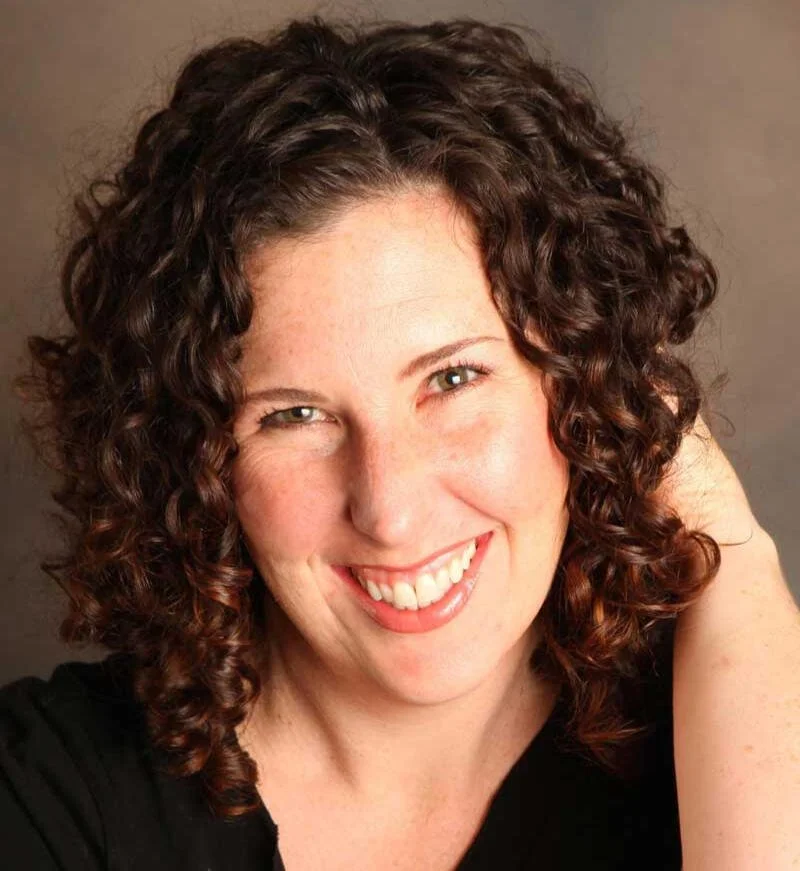
Stephanie Flynn
Stephanie Flynn loves to spread her contagious enthusiasm for fiber with everyone she meets. Her diverse teaching background includes topics in spinning, weaving, knitting, felting, and dyeing. Stephanie’s interest in fiber arts started when she was very young; later, she trained in accessory design at the Fashion Institute of Technology. Online, you can find her weaving class at craftsy.com, and her spinning classes at Schacht’s School of Textile Arts. Stephanie is coauthor (with Jane Patrick) of the book Woven Scarves. Her designs can be found in Spin Off magazine, The Weaver’s Idea Book, and Easy Weaving with Little Looms. She vows that students are sure to find inspiration in every class she teaches. Meet this instructor and learn more about her in our Five Questions with Stephanie Flynn article.
-
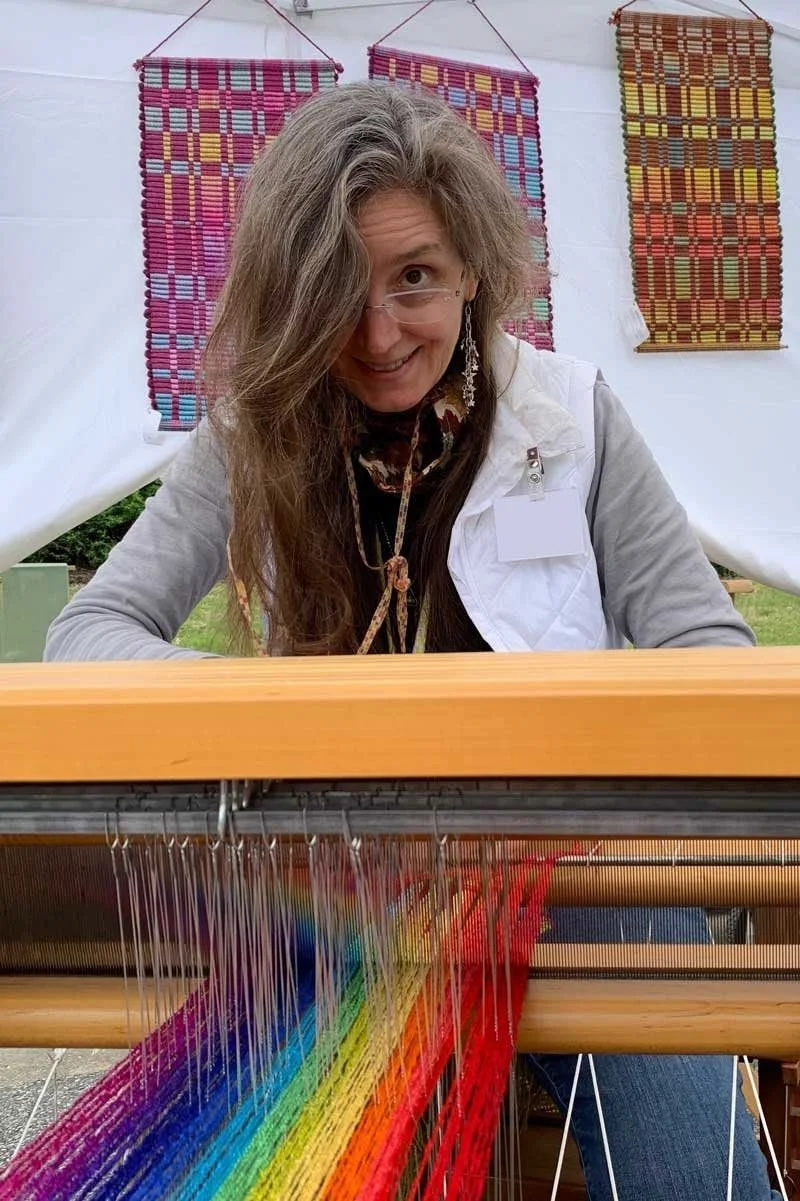
Angela K. Schneider
Angela K. Schneider is a techie and an artist—but above all, she’s a teacher. As Long Thread Media’s project editor, she checks and double-checks project instructions in an impressive range of fiber arts. Her designs regularly appear in Handwoven and Easy Weaving with Little Looms magazines, and she has created everything from delicate jewelry to massive woven installations for public spaces. With a background balancing programming, engineering, and art, plus a Master Spinner Certificate from Olds College, she relishes getting down in the details to understand a textile. One of her greatest joys comes from watching her students’ eyes light up with understanding. In this Five Questions with Angela K. Schneider article, you’ll discover just how much she loves teaching and weaving, as well as her drive to be a lifelong learner.
Itinerary
Classes and activities for multi-shaft AND small-loom weavers alike! More details for the event and class information will be added soon. Schedule is subject to change.
Sunday
Registration begins at 4 pm
Marketplace Opens!
Welcome Dinner & Introductions
Monday
Breakfast
9 am - 12 pm Morning Class Session (3 hours)
Lunch and Marketplace Shopping
1:30 - 4:30 pm Afternoon Class Session (3 hours)
Marketplace Shopping, Dinner, and Evening Keynote
Tuesday
Breakfast
9 am - 12 pm Morning Class Session (3 hours)
Lunch and Marketplace Shopping
1:30 - 4:30 pm Afternoon Class Session (3 hours)
Marketplace Shopping, Dinner, and Shop, Sip, and Weave Night in the Marketplace (following dinner)
Wednesday
Breakfast
9 am - 12 pm Morning Class Session (3 hours)
Lunch and Final Marketplace Hours
1:30 - 4:30 pm Afternoon Class Session (3 hours)
Dinner and Evening Activities
Thursday
Breakfast
Checkout & Farewell
Marketplace Hours
Sunday 4 - 6 pm | After Dinner/Welcome
Monday 12 - 1:30 pm | 4:30 - 6 pm | After Evening Keynote
Tuesday 12 - 1:30 pm | 4:30 - 6 pm | Shop, Sip & Weave
Wednesday 12 - 1:30 pm (Final Hours)
Sponsors
-

Yarn Barn of Kansas
The Yarn Barn of Kansas has been supplying Knitters, Weavers, Spinners, and all fiber crafters and artists with yarn, patterns, equipment, and accessories since 1971. Whether you are around the corner from us in downtown Lawrence Kansas, or around the country, the Yarn Barn truly is your "local yarn store" with an experienced staff to answer all your questions. Call us today at 800-468-0035 or visit our website at www.yarnbarn-ks.com to shop, learn, and explore.
-

Opulent Quilt Journeys
Opulent Quilt Journeys offers exciting, comprehensive collections of textile holidays, including our weaving excursions with Sara Bixler. All of our holidays are uniquely crafted with you in mind! Along with learning from local artisans, you'll enjoy exquisite fine crafts, cultural sites, and beautiful landscapes with like-minded travelers. We look forward to meeting you at Weave Together - our first stop on making some lasting memories together!
-

Double K Diamond Llamas and Fiber
The journey of Double K Diamond Llamas and Fiber started with myself (Karen Kinyon), my husband, and two llamas in 1988. Today, the farm and fiber company continues to serve fiber enthusiasts with finished hand-woven and hand-knit garments as well as hand-spinner's roving. We are thrilled to bring the experience of alpaca and llama fleece to Weave Together. My contact information is by phone at 970-218-0409 or by email at [email protected] or stop by the ranch! The coffee is always on!
-

Long Thread Media
Long Thread Media serves content for the handspinning, handweaving, and traditional needlework communities online, in person, and in print. The company was founded by Linda Ligon, Anne Merrow, and John Bolton to publish Handwoven, Little Looms, PieceWork, Spin Off, and Farm & Fiber Knits, as well as offer information, education, and community to crafters in those fields.
Learn More
Frequently Asked Questions (FAQ)
What classes will be offered?
Classes will cover a variety of looms and topics each day, with many options to choose from as you build your schedule. Whether you are a multi-shaft weaver or love small looms like pin, inkle, tapestry, or rigid-heddle, we’ve got classes with expert instructors that fit your interests.
How long are the classes?
Whether you yearn to learn a new technique or develop your existing weaving skills, we have something for you in this all-inclusive weaving retreat. To build your custom three-day workshop schedule, you’ll choose from a variety of options, including:
- 3-day and 2-day intensives
- 1-day focused courses
Class sizes will be small and centered on learning while doing in a stress-free environment.
Can I take just one class?
Because Weave Together is an immersive experience with activities outside class time, classes are available only as part of a 4-day package.
When do I choose classes?
NEW for Weave Together 2026: Participants will be invited to choose classes immediately after purchasing your event ticket. Look for the welcome email and the class survey to arrive shortly after your purchase is complete. To increase your chances of getting your top picks, be sure to complete your class survey and selections as soon as possible.
What if I don’t have a loom or the required equipment?
You should plan to bring your own looms if that’s possible. You’re already comfortable working on them, and at the end of the retreat, you can take home any of your work in progress. But if your travel plans will make that challenging, or if you’re taking a class on a new-to-you loom, we’ll make arrangements to borrow a limited number of looms from local weavers and companies.
About 2-3 months before the event, we’ll send out an equipment survey and rental options for your classes.
Is the event handicapped accessible?
The Embassy Suites is ADA-compliant. If you have difficulty with mobility, please let us know so we can provide further details.
Can my spouse/companion attend?
Long Thread Media needs to pre-approve spouses/companions in advance of the event to ensure that we can accommodate them. Due to space limitations, spouses/companions may not attend classes, meals, or activities without pre-approval, and additional charges may apply. Please email our Customer Service team at [email protected] for more information. Attendees who have a guest joining them should choose a private ticket type.
What if I need to change my plans?
You may cancel your registration for any reason up to 90 days before the event for a refund. We charge a 10% processing fee, so you will receive 90% of your payment back.
Can a beginning weaver come to Weave Together?
We’ll have attendees with a range of skill levels and welcome people who are early in their weaving journey. Class descriptions will indicate which sessions are suited to weavers at all levels and what equipment will be needed.
Where will the event be held?
Weave Together 2025 will be held at The Embassy Suites in Loveland, Colorado.
How do I get to The Embassy Suites in Loveland, Colorado?
The Embassy Suites is located at 4705 Clydesdale Pkwy, Loveland, CO, 80538, just off I-25. Click here to get full travel directions from nearby airports. From DIA, you can book a shuttle from Groome Transportation that will take you to the front door of the Embassy Suites. You can book shuttle reservations directly through the Groome website (look for “Loveland – Embassy Suites” for the hotel). We recommend purchasing your plane tickets no earlier than 2-3 months in advance for the lowest prices. The Weave Together itinerary is always subject to change.
